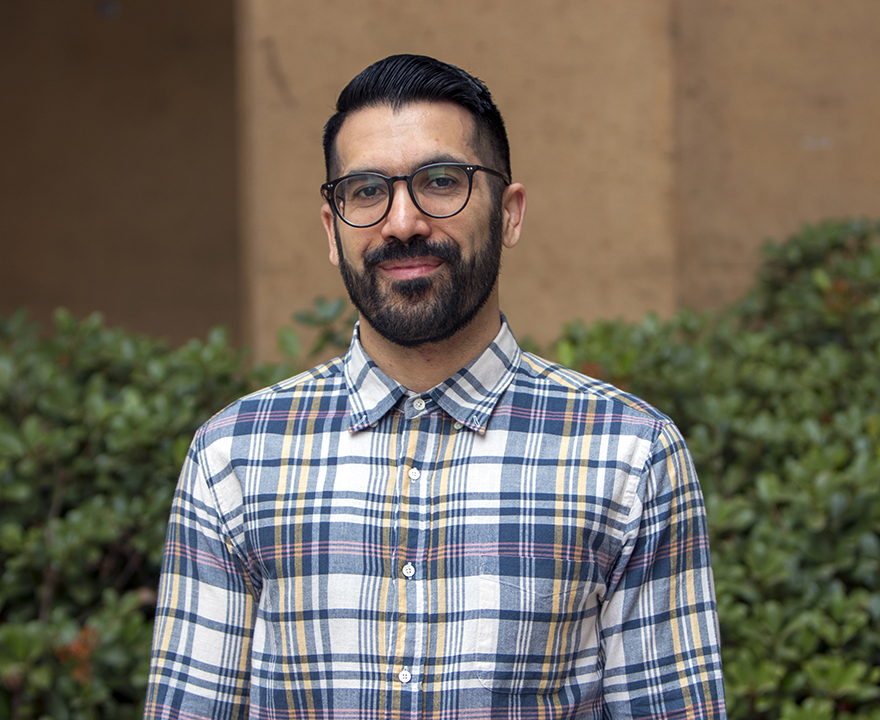Rahman earns Romney Award for work on financialization of land in Pakistan

Rahman earns Romney Award for work on financialization of land in Pakistan
- June 16, 2022
- Honor recognizes anthropology Ph.D. student for outstanding graduate paper in social sciences
Name: Tariq Rahman
Department and year in program: Anthropology, 6th year
Hometown: Phoenix, AZ
Undergrad and master’s institutions: BA in political science, Arizona State University; MA in global studies, University
of Oregon
What unique life experiences have guided your educational journey, and specifically your path to UCI?
I was born in the US, but my father was born in Pakistan, and I visited that country for the first time when I was eight years old. I remember very little else from that time in my life, but the experiences from that trip remain vivid. I think that experiencing the drastically different ways that lives, families, and cities could be organized left a lasting impression on me, and I had a curiosity about our world that eventually led me to academia. UCI’s anthropology department was the perfect fit for me because it insists on studying culture through the transnational, technological, and institutional processes that have become so powerful in society today.
What made you decide to pursue anthropology, and what interests you most about your work?
Anthropology studies people, and people are fascinating. To me, there’s no better way to understand our world than hanging out with people and talking to them. What continues to interest me about my work is my ability to bridge the everyday things that people say and do with the workings of much broader social, political, and economic processes, which we tend to view as somehow existing above human actions, intentions, and emotions.
What implications does your research have for the general community?
My work is basically about the financialization of land in Pakistan. One thing that really interests me about the current moment in our global financial system is the increasing emphasis on owning assets like land, cryptocurrencies, and NFTs over more traditional forms of wealth creation like stable employment and stock portfolios. I believe that the increasing popularity and availability of these kinds of assets calls for a shift from thinking about financialization as an abstract game played by elites and governed by cold, hard economic calculation to a much broader social phenomenon that incorporates those very human behaviors that I mentioned above. My fieldwork in Pakistan was generously supported by the National Science Foundation, the Social Science Research Council, the Wenner-Gren Foundation, the American Philosophical Society, and several other organizations. In addition to the Romney Award, my writing has received the Society for Anthropological Sciences’ H. Russell Bernard Student Paper Prize and Honorable Mention for the Society for Economic Anthropology’s Harold K. Schneider Student Paper Prize. My work has been published in the journal Economic Anthropology as well as a recent edited volume entitled, Land and the Mortgage: The History, Culture, and Property of Belonging.
Who are your faculty mentors and what impact have they had on your graduate career?
My advisor is Sylvia Nam, and I don’t think that I would be able to finish my Ph.D. without her support. There are many things to consider when asking someone to be your advisor, but I think one of the most important is having a mentor who believes in you and your work. Whether in agreement or disagreement, Sylvia has always taken my ideas seriously, which can be very rare as a graduate student. Having such an incredible mentor, both personally and professionally, is why I’m still here.
What do you plan to do after finishing your graduate degree? How has UCI prepared you well for this role?
I will apply for both academic and non-academic jobs. I love research, writing, and teaching, and my program has prepared me to do those things well. But the same skills also translate to other fields, and I’m increasingly tempted by the possibility of leaving academia’s exploitative labor conditions and banal social hierarchies. One thing that I really appreciate about both my department and UCI is their willingness to support students in both academic and alt-ac pursuits.
Any other tidbits you’d like to share?
Thank you to UCI social sciences for selecting my paper for this prize. A dissertation is an immensely personal and niche project, and it’s amazing to know that my work is resonating beyond my particular community. Winning the A. Kimball Romney Award is a wonderful professional achievement.
Share on:




connect with us